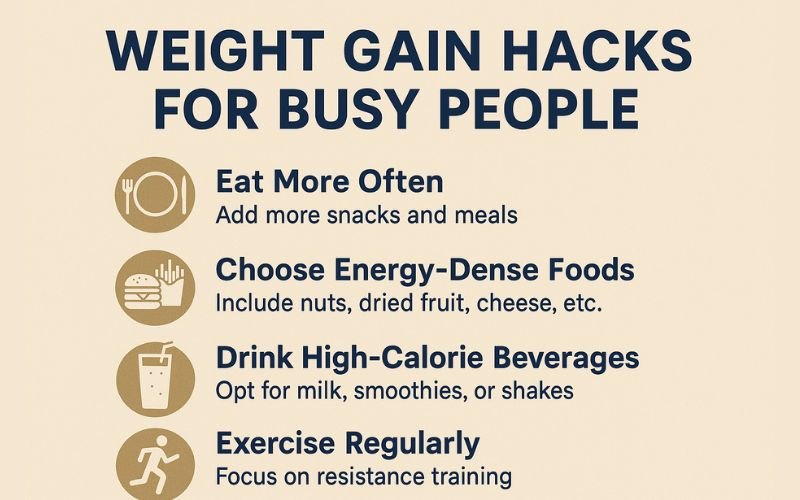No products in the cart.
Return To ShopWeight Gain Hacks for Busy People
Most health conversations focus on weight loss—but for many people, gaining healthy weight is just as challenging, especially with a hectic schedule. Between long workdays, back-to-back meetings, or chasing toddlers, it’s easy to skip meals or eat on autopilot. For naturally slim individuals or those with fast metabolisms, time constraints only make it harder to build lean mass.
If you’re trying to gain weight without relying on junk food or spending hours in the kitchen, you’re not alone. Fortunately, with the right hacks and mindset, even the busiest people can achieve sustainable, healthy weight gain.
Why Gaining Weight Can Be a Struggle — Even If You Eat a Lot
Weight gain isn’t simply about eating more—it’s about eating smart and consistently. Some people struggle to gain weight due to:
- Fast metabolism: Your body burns calories faster than you can consume them.
- Genetics: Some people naturally have a leaner body composition.
- Appetite challenges: Chronic stress, poor sleep, or medical conditions can suppress hunger.
- Busy lifestyle: Skipping meals, multitasking, or eating on the go can sabotage your efforts.
Understanding these roadblocks is the first step to overcoming them with practical strategies.
Set Your Foundation: Understand Your Caloric and Protein Needs
Before you start adding calories, it’s important to calculate your maintenance calories—the number of calories your body needs to maintain its current weight.
To gain weight, aim for a 300–500 calorie surplus per day. For muscle gain, target 1.6–2.2g of protein per kg of body weight daily. These numbers give structure to your plan, ensuring you don’t just gain fat but build lean mass.
Use apps or calculators to track your intake initially. You won’t need to track forever, but it helps build awareness.
Top Weight Gain Hacks for Busy People That Actually Work

Hack 1: Calorie-Dense Smoothies You Can Make in 5 Minutes
Smoothies are a time-saving way to pack in calories without chewing multiple meals. Blend:
- 1 banana
- 2 tablespoons peanut butter or almond butter
- 1 scoop protein powder
- 1 cup whole milk or Greek yogurt
- 1 tablespoon oats or chia seeds
- Optional: cocoa, honey, dates, or avocado
Make two in one go—drink one now, refrigerate the other for later.
Hack 2: Add Liquid Calories to Your Routine Without Feeling Full
Busy people often skip meals because they’re not hungry or don’t have time to chew. That’s where liquid calories shine.
- Full-fat milk
- 100% fruit juice
- Homemade smoothies
- Protein shakes
- Milk-based lattes
Sip these between meals or while working—they don’t require much effort but deliver a calorie punch.
Hack 3: Meal Prep High-Calorie Foods Once, Eat All Week
Cooking every day is unrealistic for many. Instead, batch-cook calorie-dense meals on weekends:
- Pasta with olive oil and cheese
- Stir-fries with beef, rice, and veggies
- Chicken thighs with roasted potatoes
- Lentil curries with rice and ghee
Store in microwaveable containers for grab-and-go convenience.
Hack 4: Snack Smart — High-Calorie, Portable Options for On-the-Go
Keep easy, high-energy snacks in your bag, car, or desk drawer:
- Trail mix
- Protein bars
- Cheese sticks
- Nut butter packets
- Granola
- Hard-boiled eggs
- Energy balls
Snack every 2–3 hours, especially between meals or during long meetings.
Hack 5: Use Nutrient-Dense Oils and Butters to Boost Calories Easily
A tablespoon of olive oil, coconut oil, ghee, or nut butter can add 100–150 calories effortlessly. Stir them into:
- Oatmeal
- Smoothies
- Rice bowls
- Pasta
- Soups
This is one of the easiest ways to increase your calorie intake without extra chewing or prep time.
Hack 6: Double Portions and Add-Ons — Make Every Bite Count
Always ask yourself: “How can I make this meal more calorie-dense?”
- Double your rice or pasta portion
- Add cheese to eggs, toast, or salad
- Top meals with avocado, seeds, or yogurt
- Choose thick spreads like hummus, pesto, or nut butters
Small changes = big gains over time.
Hack 7: Schedule Eating Alarms to Prevent Skipped Meals
If you’re the type to forget meals while working, set silent reminders on your phone. Aim to eat every 3–4 hours, even if it’s just a shake or snack. Consistency is key to staying in a calorie surplus.
Sample High-Calorie Meal Plan for a Busy Day

Here’s a realistic sample plan for someone on the go:
- Breakfast (at home or desk): Peanut butter banana smoothie + granola bar
- Mid-Morning Snack: Trail mix + protein shake
- Lunch (packed): Chicken and rice with olive oil + avocado
- Afternoon Snack: Greek yogurt + honey + nuts
- Dinner (batch-prepped): Ground beef pasta with cheese, salad with dressing
- Evening: Milk with dark chocolate or a homemade protein shake
Estimated Calories: 2,800–3,000
Supplements That Can Help You Gain Weight Safely
While food should come first, supplements are helpful for busy individuals. Consider:
- Mass Gainers: Provide 600–1200 calories per serving
- Whey Protein: Quick, clean protein source—great for smoothies or post-workout
- Creatine Monohydrate: Increases strength and muscle volume over time
- Omega-3s: Support recovery and calorie absorption
- Multivitamins: Fill nutrient gaps
Always check for 3rd-party tested products, and use them to complement meals, not replace them.
How to Combine Weight Training with a Busy Schedule
To turn weight gain into lean muscle, strength training is essential. If you’re short on time:
- 3 full-body sessions per week (30–45 minutes each)
- Use compound exercises: squats, deadlifts, push-ups, rows
- Home workouts? Use resistance bands or bodyweight circuits
Consistency trumps intensity. Just showing up regularly will get results.
Avoid These Common Mistakes When Trying to Gain Weight
- Skipping meals due to lack of time or appetite
- Relying on junk food, which adds fat, not muscle
- Not tracking progress, leading to plateaus
- Overtraining without enough recovery or fuel
- Expecting fast results — weight gain is a slow, steady process
Track Your Progress: What to Measure and How Often
Don’t obsess over the scale—track smart:
- Weekly weigh-ins (same time, same clothes)
- Progress photos every 2–4 weeks
- Strength metrics (weights lifted, reps, sets)
- Energy and appetite levels
- Clothing fit and measurements
Seeing small wins keeps motivation high.
Final Thoughts: Sustainable Weight Gain Takes Strategy, Not Just Eating More
Healthy weight gain isn’t about stuffing yourself—it’s about being intentional with your food, workouts, and schedule. With the right calorie-dense foods, simple prep routines, and strategic eating habits, even the busiest people can build strength, energy, and lean mass over time.
Don’t wait for the “perfect” moment—start with one hack today. Your future self will thank you.
Bulk up smart—explore expert-backed weight gain hacks and top supplements at SportsOne.









Add comment